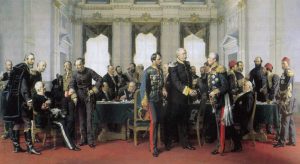Siyah: The Ottoman Scramble for Africa
This is the fifth instalment in ‘Siyah’, a series exploring African Diaspora and Turkish social and cultural narratives, with journalist Adama Juldeh Munu. Courtesy of the Ottoman History Podcast, the following interview looks into Ottoman diplomacy in Africa against the backdrop of nineteenth century European colonial politics.
The Scramble for Africa is a term to describe the outcome and implications of the 1884-1885 Berlin Conference, attended by European nations with the exception of Switzerland, and including representatives from the Ottoman Empire and the United Kingdom. As writer Patrick Gathara states in an Al Jazeera article: “The West African Conference of Berlin would last 104 days, ending on February 26, 1885. In the 135 years since, the conference has come to represent the late 19th century European scramble and partition of the continent … It did something much worse, though, with consequences that would reverberate across the years and be felt until today. It established the rules for the conquest and partition of Africa, in the process legitimising the ideas of Africa as a playground for outsiders, its mineral wealth as a resource for the outside world not for Africans and its fate as a matter not to be left to Africans.”

The Ottoman Empire occupied an unusual place among the competing imperial powers of the nineteenth century. On the one hand, a weak military position often forced the Ottomans to accept unfavorable economic and political arrangements while playing other empires off each other to maintain autonomy. On the other, there was an expansion of state institutions throughout Ottoman domains and an increased Ottoman presence in many parts of Asia and the Indian Ocean region. Many even point to a form of Ottoman colonialism practiced at the empire’s frontiers. Mostafa Minawi offers a glimpse into the Ottoman Empire’s role in the realm of strategic imperial diplomacy within the context of the Scramble for Africa and European competition over influence on the continent.
Hosted by Christ Gratien
Special guest: Mostafa Minawi, Assistant Professor of History at Cornell University
Listen here.
Source: “The Ottoman Scramble for Africa,” Mostafa Minawi and Chris Gratien, Ottoman History Podcast, No. 143 (1 February 2014)



